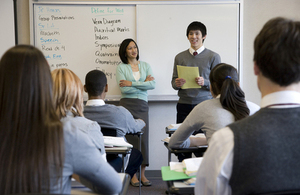Thousands more 16- and 17-year-olds in education or training
New figures reveal that 35,000 more 16- and 17-year-olds are in education or training.

Student giving a presentation
Skills and Enterprise Minister Matthew Hancock today hailed new figures revealing that 35,000 more 16- and 17-year-olds are in education or training.
Local authority statistics show that:
- 89.8% of 16- and 17-year olds were in education or training, compared to 87.9% the year before, equivalent to 35,482 more young people
- more than three-quarters of local authorities reported higher numbers of 16- and 17-year-olds in education or training than the previous year
These figures echo the Office for National Statistics’ latest Labour Force Survey, which also showed more 16- and 17-year-olds were in education or training at the end of 2013 than the previous year.
Skills and Enterprise Minister Matthew Hancock said:
Tens of thousands more young people in education or training is welcome news. We have introduced new traineeships, have reformed apprenticeships and have raised the participation age to help more young people into the world of work.
This shows good progress. We have a clear programme of reforms to improve the quality of young people’s education to ensure, through traineeships and apprenticeships, that all have the chance to reach their potential.
The government has a package of measures to help young people get the best possible start in life. This includes:
- a programme of traineeships, including more than 500 training organisations such as Virgin Media and Siemens
- radically reforming apprenticeships so that they are more rigorous and responsive to the needs of employers
- replacing the wasteful and inefficient Education Maintenance Allowance (EMA) with targeted financial support through our £180million 16 to 19 bursary fund
- requiring schools and colleges to provide independent careers guidance up to age 18
Young people leaving secondary school must now continue in education or training until age 17. From September 2015, this will rise to 18. These figures, which are the first local authority figures to be released since the government made these changes, also show that 93.9% of 16-year-olds are participating, the first year group to be affected by the change in the law on participation.
There is a variation in performance between local authorities and it is clear that some are still failing to track young people’s participation effectively. In October 2013 the Skills Minister wrote to 12 local authorities who are failing to properly track the activity of young people.
While today’s figures show that local authorities are improving the way they record the education of their young people, the minister will write to a further 9 underperformers.
The local authorities with the highest participation percentages are:
- Harrow (97.8%)
- Ealing (96.1%)
- Redbridge (95.6%)
- Hillingdon (95.3%)
- Brent (95%)
- North Somerset (94.9%)
- Hammersmith and Fulham (94.8%)
- Hounslow (94.6%)
- Cheshire East (94.5%)
- Warrington (94.5%)
The local authorities with the lowest participation percentages are:
- Worcestershire (68.9%)
- Croydon (76.5%), Rutland (78.5%)
- South Gloucestershire (82.1%)
- Birmingham (82.3%)
- Derby (83.5%)
- Bristol (84.3%)
- Oxfordshire (84.6%)
- Barking and Dagenham (84.8%)
- Lewisham (84.8%)
Notes to editors
- Download the full local authority participation statistics for 16- and 17-year–olds.
- The difference between the number of 16- and 17-year-olds recorded by local authorities as participating in education and training in the December 2012 data and the December 2013 data is 41,394. But, East Riding of Yorkshire failed to provide data in December 2012, so their December 2013 data (6,812) has not been included in the total of 35,482 mentioned above.
DfE media enquiries
Central newsdesk - for journalists 020 7783 8300